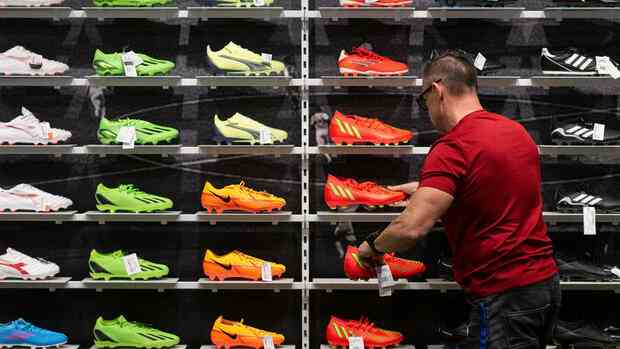The chain of retailers is benefiting from the stronger demand for sneakers and other sportswear.
(Photo: dpa)
Munich After the change of management at Adidas, the Intersport dealers in Germany are hoping for good business with the world’s second largest sporting goods manufacturer. “The new management is definitely trade-oriented, and we are very grateful for that,” said Frank Geisler, Chief Operating Office of the dealer association, on Wednesday. Adidas is an important strategic partner.
Ex-Adidas boss Kasper Rorsted had focused heavily on expanding his own online shops. During the pandemic, some of the company’s own sales channels were given preferential treatment, which alienated many specialist retailers. His successor, Björn Gulden, who took office at the beginning of the year, had already prioritized specialist retail as head of Puma, and in some cases also forgone margins.
Investors trust Gulden to find the middle ground in his new job – and apply proven strategies from Puma to the conditions at Adidas in a modified way. Thomas Jökel, portfolio manager at Union Investment, said it would be possible to win back disgruntled dealers without giving up progress in e-commerce. “I trust that Mr. Gulden will make the right decision here.”
Intersport achieved record sales of 3.3 billion euros
At Intersport, Adidas was the most important brand in the past financial year, ahead of Nike and McKinley’s own brand. In order to strengthen the position, Intersport agreed on a so-called single account model with Adidas in 2022. The group therefore orders centrally and keeps the Adidas products in its own warehouses. Hundreds of dealers had previously ordered individually. “We are thus ensuring our relevance at Adidas,” said Geisler.
Top jobs of the day
Find the best jobs now and
be notified by email.
Intersport has 463 locations under its own brand and a total of around 1700 points of sale. External sales rose by 25 percent to a record 3.3 billion euros in the 2021/22 financial year, which ended on September 30. The association was thus 14 percent above the value before the outbreak of the pandemic. “We came out of the crisis much stronger than we went in,” said Intersport boss Alexander von Preen.
Most recently, the group has seen a trend back into business. “Customers are increasingly buying from local dealers again,” said Geisler. Intersport’s online sales even fell in the past financial year because the scarce goods were given preference to being delivered to the shops. However, the e-commerce share is expected to increase again in the coming years.
The sports boom continues even after the peak of the pandemic
Intersport boss von Preen is convinced that the sports boom will continue even after the pandemic. The market in Germany could grow by three to five percent in the coming years, Intersport wants to be above that.
However, there have recently been reports in the industry of overcrowded warehouses. Since the goods were temporarily scarce during the pandemic due to logistics and production problems, some retailers ordered more to be on the safe side – and are now sitting on the goods. The situation is certainly not critical, said Intersport manager Geisler. There aren’t many seasonal goods in the warehouses that need to be moved quickly.
Sports retail in Germany is highly competitive. The French discounter Decathlon has announced that it intends to double its sales in Germany to 2.5 billion euros by 2026. In addition, dealer associations dominate. Sport2000 focused early on specializing in trend sports such as running and mountaineering and most recently achieved external sales of 2.8 billion euros with around 1,000 dealers.
More: When customers buy no-name products and when they still use the brand
